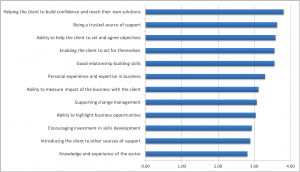
 Last month we asked our readers "What Makes Great Business Support?". The survey was put together to feed into the review of the National Occupational Standards (NOS) for business support led by SFEDI. The National Occupation Standards focus on what individuals need to do, know and understand to carry out their job role competently. They promote industry best practice and have been developed by industry practitioners covering all industry sectors.
Last month we asked our readers "What Makes Great Business Support?". The survey was put together to feed into the review of the National Occupational Standards (NOS) for business support led by SFEDI. The National Occupation Standards focus on what individuals need to do, know and understand to carry out their job role competently. They promote industry best practice and have been developed by industry practitioners covering all industry sectors.
We were keen to find out what you felt business support professionals needed to do, know and understand to be great at their jobs.
What kind of business support had they had?
Only 50% of recipients had accessed any form of business support in the past year.
Of those that had accessed a form of business support, the majority had worked with mentors (27%), followed by advisers (19%) and coaches (19%). Consultants and trainers had been accessed least often (at 13% each).
What has changed in the business support landscape over the past 3 years?
We asked participants to list three things that they felt had changed about business and enterprise support in the UK since 2010. The key themes that arose where that people felt that there was more business support available, or at least that it was more visible, particularly in the area of mentoring.
There was a high emphasis put on the move from face to face support to online, with a mix of those that saw this as a positive or negative move.
A positive change that a few people highlighted was that more businesses seemed to understand the value of support to their business. As well as this there was a feeling that there was an increase in support around particular interests or needs, such as exporting or change management. On the negative side a couple of people felt there was lack of leadership and trust in the business support sector.
What do you value most when choosing support?
When asked what they valued most when choosing a business adviser, the three answers with the highest results, were that the advisor was 'reliable and trustworthy', had 'experience of running their own business', followed by 'experience of your type of business'. Of lowest importance were, 'value for money' and a 'nice person to do business with'.
 What attributes and behaviours are associated with good business support?
What attributes and behaviours are associated with good business support?
We then went on to list the attributes and behaviours associated with good business support, rating them according to how important they were to the recipient. The recipients gauged them from 1 to 4, with 1 = "not important" and 4 = "essential". Click on the image on the left how each attribute scored, listed from the highest scoring attribute to the lowest.
What was interesting is that two of the top three scoring attributes were about helping the client to solve their own issues and challenges, rather than having specific expertise to help directly. The second highest scoring attribute is about being a trusted source of support, which highlights the importance of trust in the relationship.
What's the most effective way for business support to be delivered?
We asked what the most effective way was for business support to be delivered. Over half of the recipients (59%) felt it was face to face in a one to one meeting, however 37% simply replied that it depended on the business and their needs.
Positive and negative traits of business support
We asked what three positive traits typified a good business support professional, and which three typified someone who didn't do this role as well. See below some of the main responses and themes in order of how much they were referred to by the recipients.
| POSITIVE | NEGATIVE |
| Good listening skills
Knowledgeable Honesty/Integrity Approachable & easy to get on with Empathy Self Awareness Trustworthy Experience Can-do attitude Ability to transfer learning Capability and Common sense Emotional Intelligence Enthusiasm Impartial Inspires confidence Reliability Respectful Supportive |
Egotistical
Bombastic Bad listener Makes assumptions Unable to respect boundaries of the relationship Lack of empathy Unable to allow the client to think for themselves Lack of trust and direction Unmotivated Narrow range of skills and contacts Not being adaptable Never having run a business Hasn't worked in sector before Out for a fast buck Unsure of themselves or 'woolly' Someone who says they are an expert Evasive or distant Conflict aversion - a 'people pleaser' |
What's the best piece of advice you've had this year?
Finally we asked people what the best piece of business advice they had received over the past year. Not everybody shared there's, but here's what those that did said:
On planning . . .
"To check my financial forecasting was correct for the type of product I wanted to market"
"Be clear about your outcomes"
"Think first" . . . . which was contrary to . . . "go before you're ready otherwise you won't do anything"
On keeping on track . . .
"Widen network"
"Don't get too involved in the company politics!"
"Open ears open and keep mouth shut"
On staying motivated . . .
"I'm on the way up and can achieve"
"Keep focused"
"Keep calm and carry on!"
"Just Do It!"
Do you agree with the findings of the survey, what do you think makes great business support, or epitomises a great business support professional? Let us know via twitter or at [email protected]
SFEDI Solutions has now completed the review of the business support National Occupational Standards (NOS), and these will be available shortly on the NOS directory. As well as this SFEDI Solutions will be publishing a paper on the business support landscape. Links to both of these will be provided in upcoming issues of Mentoring and Enterprise Monthly.
If you want to find out more about the review of the National Occupational Standards, email Leigh Sear or call 01325 307 366.


